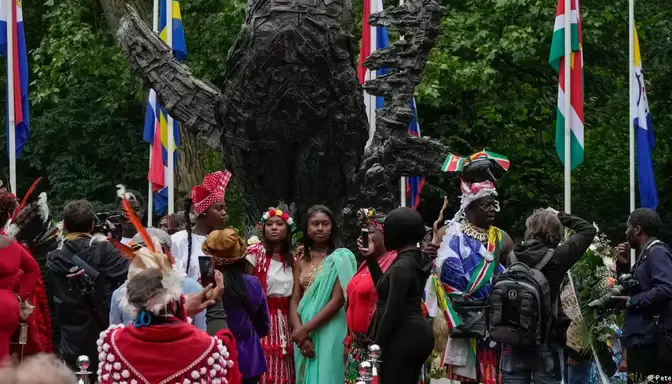Diksia.com - For the second time in six months, Amsterdam district representative Vayhishta Miskin prepares for a historic event, one that may have been unimaginable for many Surinamese descendants like herself.
Following Dutch Prime Minister Mark Rutte’s apology for the historical slave trade in Suriname and his promise of €200 million for educational initiatives in December, King Willem-Alexander delivered a formal apology on Saturday, July 1, 2023.
“What people have told me is that they feel emotional about the prime minister’s apology because these are words they have been waiting for since 1863,” said Vayhishta Miskin to DW in Amsterdam. “This is a first step for us to move forward and heal as a society.”
July 1 marks 150 years since the de facto end of Dutch slavery and 160 years since the official abolition of Dutch slavery in the Caribbean. King Willem-Alexander’s apology holds symbolic value.
However, in Vayhishta Miskin’s neighborhood in southeast Amsterdam, where many local residents have roots in former colonies like Suriname and the Dutch Antilles, the bigger question for many is: What happens next?
A dark history The community has held meetings to discuss this question.
“What people have told us is that they want the injustices and inequalities they have experienced in the past and continue to face today to be rectified,” said Vayhishta Miskin.
“Even if we accept the king’s apology, what does that really mean?” she added. “What people truly need is for their children to receive a quality education, for their children to secure employment,” she pointed out, referring to the ongoing inequalities in the Netherlands.
During its colonial heyday, the Netherlands led a vast global trading network as one of the world’s major imperial powers.
Over the centuries, the Dutch were responsible for approximately 5% of the total transatlantic slave trade, buying and transporting nearly 600,000 enslaved individuals from Africa to the Caribbean colonies and other European colonies throughout the Americas.
Enslaved Africans were also forcibly transported to Dutch colonies in the Indian Ocean, such as present-day Indonesia, and enslaved Balinese or Javanese people were relocated to what is now South Africa.
Overall, 15% of the enslaved individuals brought from Africa to the Americas in the transatlantic trade did not survive due to harsh conditions during the crossing, not to mention the many who died before even leaving Africa.
The survivors and their descendants faced brutal plantation lives, enduring forced labor and often cruel punishments for perceived disobedience. The Netherlands was one of the last European countries to abolish slavery in its colonial territories.
From apologies to reparations demands According to Mia McMorris, a researcher at the University of the West Indies Center for Reparations Research, the appropriate apology for slavery and its direction are clear.
“An apology should have three dimensions. The first is responsibility, which should mean understanding and acknowledging one’s mistakes,” she said.
The second is addressing present-day legacies, tackling “the perpetuation of colonial narratives, racial profiling, anything that promotes racial inequality,” said Mia McMorris. And the third is redemption.
There are very few real-world examples of reparations, said Wouter Veraart, a professor of legal philosophy at the Free University of Amsterdam.
The key lies in the 1952 negotiations between post-Nazi West Germany, Israel, and the Claims Conference, a Jewish diaspora umbrella organization after the Holocaust.
“The reparations offered and negotiated between West Germany and Israel were not based on calculating all the profits or losses but on what was needed in Israel at that time,” he explained.
Last year, Germany officially recognized the early 20th-century genocide in Namibia and pledged approximately €1 billion in development assistance as reparations.
“If you truly want to confront this history and no longer ignore it, why not engage in dialogue with Suriname, for example, about what reparations mean?” said Wouter Veraart.
McMorris sees much work to be done but also reasons for optimism. “We are in a changing world now,” she said, referring to recent steps taken by non-state institutions to investigate their own ties to slavery.
“People are questioning,” she said. “They say this is not right. And that’s the core of the reparations movement, understanding that these things are not right, and we need to rectify this injustice.”






